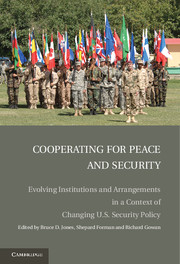 Cooperating for Peace and Security
Cooperating for Peace and Security Book contents
- Frontmatter
- Contents
- Contributors
- Foreword
- Acknowledgments
- I FRAMEWORK
- II ADAPTING COLD WAR INSTITUTIONS
- III NEW TOOLS, NEW MECHANISMS
- 10 Normative Evolution at the UN: Impact on Operational Activities
- 11 Constructing Sovereignty for Security
- 12 New Arrangements for Peace Negotiation
- 13 International Humanitarian Cooperation: Aiding War's Victims in a Shifting Strategic Environment
- 14 The Evolution of Regional and Subregional Collective Security Mechanisms in Post–Cold War Africa
- 15 International Courts and Tribunals
- IV CONCLUSIONS
- Index
- References
14 - The Evolution of Regional and Subregional Collective Security Mechanisms in Post–Cold War Africa
Published online by Cambridge University Press: 22 January 2010
- Frontmatter
- Contents
- Contributors
- Foreword
- Acknowledgments
- I FRAMEWORK
- II ADAPTING COLD WAR INSTITUTIONS
- III NEW TOOLS, NEW MECHANISMS
- 10 Normative Evolution at the UN: Impact on Operational Activities
- 11 Constructing Sovereignty for Security
- 12 New Arrangements for Peace Negotiation
- 13 International Humanitarian Cooperation: Aiding War's Victims in a Shifting Strategic Environment
- 14 The Evolution of Regional and Subregional Collective Security Mechanisms in Post–Cold War Africa
- 15 International Courts and Tribunals
- IV CONCLUSIONS
- Index
- References
Summary
Although it was widely believed that the end of the Cold War significantly reduced Africa's strategic importance, few commentators acknowledged the unique opportunities it offered for regional cooperation – not least in the field of security. At the same time, the violent internal conflicts that erupted during this period exposed the lack of effective African response mechanisms. In West Africa, the Economic Community of West Africa States' (ECOWAS) intervention in Liberia and Sierra Leone in the 1990s demonstrated the complex challenges of invoking Cold War-era institutions to deal with domestic conflicts. The cooperative security instruments that were developed during the Cold War mirrored the primacy of the “state-centric” approach to security, with its primary focus on interstate security. But, most of the conflicts that erupted in Africa in the 1990s were internal, though with wider regional effects. To adequately respond to and address the new forms of conflict, existing entities were restructured and new ones established. In Africa, the restructuring of ECOWAS, the Southern African Development Coordination Conference (SADCC), and the Organization of African Unity (OAU) are some of the most notable efforts at developing effective conflict management mechanisms. Similar processes took place in East Africa with the transformation of the Inter Governmental Authority in Drought and Desertification (IGADD) and the revamping of the Economic Community of Central African States (ECCAS).
The structural transformation of these institutions was underpinned by a paradigm shift in the understanding of security, from state-centric to a more people-centered approach, in other words, human security.
- Type
- Chapter
- Information
- Cooperating for Peace and SecurityEvolving Institutions and Arrangements in a Context of Changing U.S. Security Policy, pp. 269 - 290Publisher: Cambridge University PressPrint publication year: 2009
References
- 3
- Cited by


